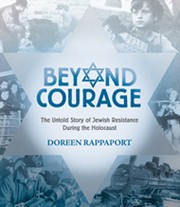Recently, publishers have been presenting the Holocaust as a picture story book for children from ages five to eight. Stone Angel is a beautiful book, exquisitely illustrated and poetically written for young readers by a brilliant writer. I would give it a prize. It is so beautiful, it deserves one — for beauty and language. But is it realistic? Not really. The Nazis have invaded France, the Jews must wear badges, the storekeeper no longer sells them their favorite treat, but outside their apartment building is a stone angel. Will it still be there when they return? If it is — TRIUMPH!
When can they return? Not before hiding in the woods, fighting with the German soldiers (off page), and climbing a scary, beautiful mountain in the woods. They board a boat on the other side and land in England where they sit out the war on a cute little farm. And after the war, the refugees just return to their country, to their neighborhood, with the angel still on the building. They are lively and happy although many in their family have been killed.
In truer stories, groups of Jewish children escaped in small groups over the same mountains, the Pyrenees, to Spain. If they did not escape the Nazis, they would have been forced to board the train and follow the friends who have been caught straight to Auschwitz. But that’s not suitable for five-year-olds.
Stone Angel is far from reality. Exquisite as it is, and as gracefully as it is told, it is not reality. In this book the Shoah is frightening, a little — but still pretty. The topic is premature for its audience. Children need to be at least ten years old for a proper introduction to the Holocaust.
Stone Angel, review by Marcia Berneger
A picture book about the Holocaust is no easy task, but masterful writer Jane Yolen has succeeded with her poignant new book, Stone Angel. Using her amazing picturesque language, Ms. Yolen weaves the story of a young girl and her family forced to abandon their Paris home during the Nazi Invasion. Complementing the gentle text are Katie May Green’s beautiful illustrations. The images are filled with shadowy grays and muted colors, portraying the events in a nonthreatening way.
To avoid capture, the family hides in the forest, foraging for food from the trees and plants surrounding them. Maman’s soft lullabies and comforting tales of angels watching over them soothe the little girl (whose name we never learn), sheltering her, and the reader, from the horrors surrounding them. The family is soon joined by others fleeing the same enemy. When Papa decides the forest has become too dangerous, he takes the family over the mountains toward Spain, hoping to find passage to England where Cousin Jacob lives. But the journey to Spain has dangers of its own, and Aron, the little brother, becomes very sick. “Ask your angels to look after him,” Maman tells her daughter. And the little girl does just that.
We continue to follow the family’s journey to England, where they spend four peaceful years with Cousin Jacob. When the war ends, the family joyously returns to Paris. Looking up at the window of her new apartment, the little girl sees a stone angel smiling back at her. She is sure it is the one who had watched over them, keeping them safe until they could return. The story ends on this comforting note. Ms. Yolen also includes an end-page with a short description of the Holocaust.
Stone Angel is a gentle introduction to the Holocaust for young readers. Bravo to Jane Yolen and Katie May Green! Recommended for ages 5 – 8.





